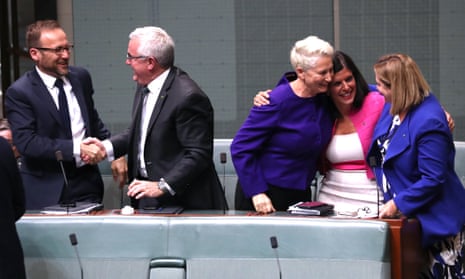AG Christian Porter is trying to peel off crossbench votes by saying they MUST make a ruling on s53 of the constitution, but House of Representatives Practice suggests they can decline to form a view on that and just pass the bill #auspol #auslaw pic.twitter.com/IDlz2Oy0Xn
— Paul Karp (@Paul_Karp) February 12, 2019
Government loses 'de facto confidence' vote as medevac bill passes – as it happened
It’s the first time in 90 years that a sitting government has lost a vote on its own legislation. This blog has now closed
Tue 12 Feb 2019 03.57 EST
First published on Mon 11 Feb 2019 16.18 EST- Scott Morrison press conference
- Government suffers historic defeat on substantive legislation.
- Scott Morrison urges parliament to reject bill
- Passing bill a potential 'no confidence' in government - constitutional expert
- House can still pass legislation – the advice fine print
- Government legal advice says medevac 'unconstitutional'
- Speaker tables solicitor general advice on medevac bill
- Question time (finally) begins
- Here is the latest situation report as best things can be currently understood
- Greens will not support Labor amendments
- Where is this likely to go?
- Good morning

Live feed
- Scott Morrison press conference
- Government suffers historic defeat on substantive legislation.
- Scott Morrison urges parliament to reject bill
- Passing bill a potential 'no confidence' in government - constitutional expert
- House can still pass legislation – the advice fine print
- Government legal advice says medevac 'unconstitutional'
- Speaker tables solicitor general advice on medevac bill
- Question time (finally) begins
- Here is the latest situation report as best things can be currently understood
- Greens will not support Labor amendments
- Where is this likely to go?
- Good morning
Christian Porter says it is not a “technical” question, but one that is clearly laid out in the constitution.
He says if the House passes the bill, it will give the power to control finances to the Senate.
“Everything that we do here has a consequence,” he says.
Porter is telling the House it is "inarguable" that the legislation would impose an increase in a standing appropriation, and trigger an obligation on the part of the minister and the Rem Tribunal. This is not "speculative", he says #auspol
— Katharine Murphy (@murpharoo) February 12, 2019
Christian Porter is attempting to convince the House to vote the bill down.
He has warned against the “haste” in which the amendments were created.
Statement by the Speaker on the Senate amendments to the Home Affairs Legislation Amendment (Miscellaneous Measures) Bill 2018. "It is a matter for the House as to how it wishes to proceed with the Senate’s amendments." #auspol pic.twitter.com/BhoQUZdaxq
— Political Alert (@political_alert) February 12, 2019
“I will leave it in the hands of the House over how to proceed,” Tony Smith says.
The bill is up for debate in the House.
Tony Smith is making a statement on the constitutional circumstances of the bill.
Passing bill a potential 'no confidence' in government - constitutional expert
Right. Stakes are RAISED.
In the last 10 minutes, we have reached de-facto vote of no confidence territory.
Why?
As Anne Twomey, one of the nation’s best constitutional experts, told Sky:
“... If the bill actually gets passed against the wishes of the government, that would be an indication that the government has lost control over the finances of the country.
“Now that is critical, in terms of confidence in loss of government.
“... Back in 1941, the Fadden government fell when its budget was reduced by one count. It just needs to be a nominal showing of the fact that the government has lost control of the finances.
“So on the one hand, raising this may cause the House to decide, well, in the circumstances, we won’t pass it in this form and so [doesn’t] proceed, on the other hand, if it fails on this point, it is actually putting itself in a more vulnerable position in regards to the issue of confidence.”

To address one potential query – if the problem is that medical panel members would be paid, does the constitutional problem go away if they work for free?
Solicitor general Stephen Donaghue’s advice addresses the point by noting that the Remuneration Tribunal Act creates an obligation on the tribunal to determine the pay of people holding public office. Although the medevac bill itself doesn’t contain provisions about pay, it will cause an expense to be incurred.
The government could exclude panel members so that they aren’t paid, but Donaghue said he is “instructed that the government has no intention of making such regulations”.
It seems to make good the section 53 constitutional point, the government has said – yes, panel members will be paid.
And then
If the house votes on a money bill against the government's wishes, Anne Twomey says - that could constitute a vote of no confidence, @SkyNewsAust https://t.co/mLRJwyUHhM
— James O'Doherty (@jmodoh) February 12, 2019
Comments (…)
Sign in or create your Guardian account to join the discussion